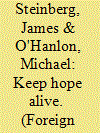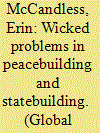| Srl | Item |
| 1 |
ID:
132152


|
|
|
|
|
| Publication |
2014.
|
| Summary/Abstract |
At their summit in California last June, U.S. President Barack Obama and Chinese President Xi Jinping committed themselves to building trust between their countries. Since then, new official forums for communication have been launched (such as the military-to-military dialogues recently announced by the two countries' defense ministers), complementing existing forums such as the Strategic and Economic Dialogue (which features the countries' top diplomats and economic officials). But despite these efforts, trust in both capitals -- and in the countries at large -- remains scarce, and the possibility of an accidental or even intentional conflict between the United States and China seems to be growing. Given the vast potential costs such a conflict would carry for both sides, figuring out how to keep it at bay is among the most important international challenges of the coming years and decades. The factors undermining trust are easy to state. East Asia's security and economic landscape is undergoing massive, tectonic change, driven primarily by China's remarkable economic rise in recent decades. That economic miracle, in turn, has made it possible for China to increase its military capacity and ramp up its political role in the region and beyond. China's leaders and prominent strategists have been at pains to insist that China's rise will be peaceful and poses no threat to its neighbors or the existing international political and economic order. But many members of the world community remain concerned and even skeptical, noting that history and international relations theory are replete with examples of conflict arising from clashes between a dominant and a rising power."
|
|
|
|
|
|
|
|
|
|
|
|
|
|
|
|
| 2 |
ID:
163724


|
|
|
|
|
| Summary/Abstract |
Using the theoretical toolkit of material-semiotics, this article theorizes global migration governance as a governing technology that constitutes migration as an object of global governance. Methodologically, the analysis draws on event observation of the International Organization for Migration's International Dialogue on Migration. Empirically, the article uses the illustrative example of the International Organization for Migration's Migration Governance Index to make the case for a material-semiotic account of global migration governance more concrete. Overall, the article seeks to examine and enhance the contribution that practice-theoretical approaches make to the analysis of global governance.
|
|
|
|
|
|
|
|
|
|
|
|
|
|
|
|
| 3 |
ID:
121427


|
|
|
|
|
| Publication |
2013.
|
| Summary/Abstract |
Peacebuilding and its relatively new partner in international policy discourse and practice-statebuilding-are moving in increasingly larger circles with the recognition that business cannot be done as usual in fragile and conflict-affected states where 1.5 billion of the world's population resides. With rising prominence comes ever greater scrutiny about their nature and means for their practical realization. This article reflects on a question central to this scrutinizing that has befuddled scholars, practitioners, and policymakers alike over the past decade-how should progress out of fragility and conflict, or toward peacebuilding and statebuilding, be measured? Investigating a related question-are we making progress on this profoundly challenging task?-the article considers how international actors are endeavoring to make right on their promise to put national actors at the helm of these projects, which is increasingly assumed to be the primary driver for success in both. Examining these questions in light of scholarship, practice, and a topical policy dialogue case-the International Dialogue on Peacebuilding and Statebuilding-the article argues that, while the process and emerging outputs are messy and challenge established norms of what constitutes good assessment, they are manifesting profound changes in policy and practice, with potentially radical implications for the ways that peacebuilding and statebuilding are measured and aid decisions are undertaken.
|
|
|
|
|
|
|
|
|
|
|
|
|
|
|
|